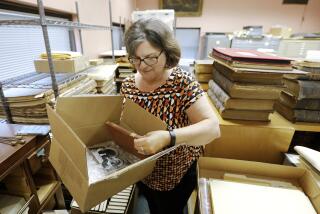A rare-book bonanza in the digital age? ‘Common Sense’ says yes
- Share via
The digital era has been good for old books, an expert in rare books said earlier this week.
Matthew Haley, head of rare books and manuscripts at the Bonhams auction house in London, said that news of rare books moves faster and wider than ever before and that this is driving up prices at the high end of the book market, while Internet shopping was helping the lower end.
When a new treasure is discovered, “More people can find it and there is only one of them around,” he told an audience at the Hay Festival of Literature and Arts in Wales, as reported by Reuters.
At the same time, demand is growing for what Haley called “quirkiana,” or books on specialty, niche topics.
“We see that the mid-rank is really the struggling area of the market,” Haley said, referring to books that sell for between $150 and $1,500.”
As if to prove Haley’s point, the New York auction house Sotheby’s announced Wednesday the sale of seven books from George Washington’s Mount Vernon library for $1.2 million. It was part of a sale of books described as being from “The Library of a Distinguished American Collector,” which sold for a total of $4.8 million.
One book in the auction broke a record: a first-edition copy of Thomas Paine’s “Common Sense” from 1776 that sold for $545,000. A first edition of Charles Darwin’s “On the Origin of Species” (1859) and Walt Whitman’s “Leaves of Grass” (1855) sold for $209,000 and $149,000, respectively.
The books sold from Washington’s collection all contained the first president’s “bold signature” on their title pages, Sotheby’s said in a press release, and included novels by Jonathan Swift and Alain Rene Le Sage.
ALSO:
Happy birthday, Richard Scarry!
Winnie-the-Pooh and Penguin take stage in e-book trial
Author Samantha Power to be nominated as U.N. ambassador
More to Read
Sign up for our Book Club newsletter
Get the latest news, events and more from the Los Angeles Times Book Club, and help us get L.A. reading and talking.
You may occasionally receive promotional content from the Los Angeles Times.







